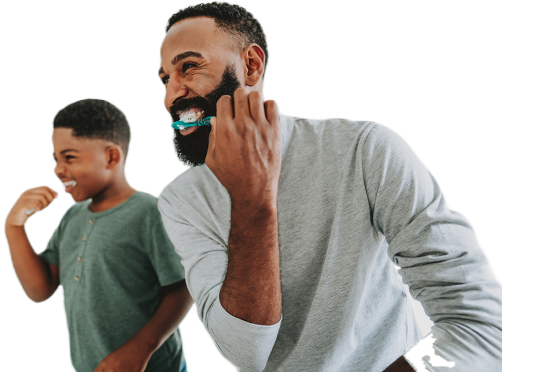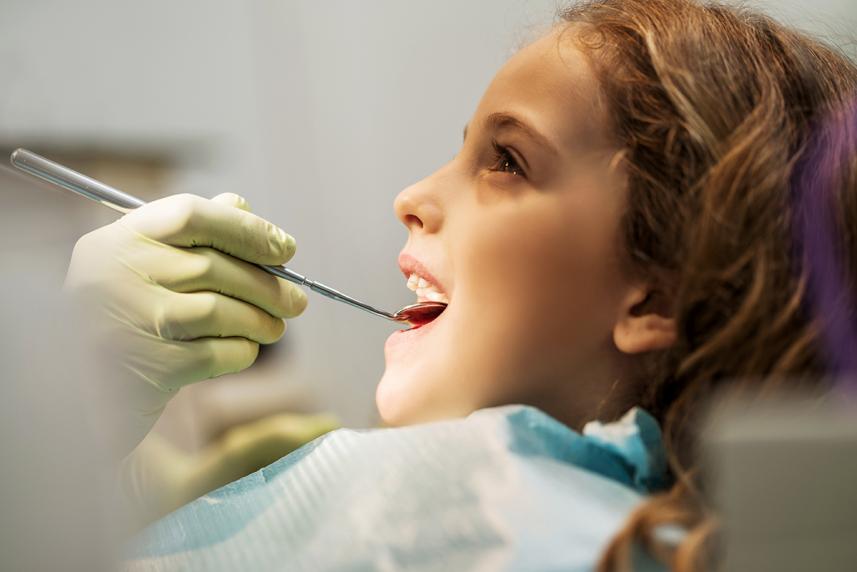
Your Premier Access plan makes it easy. No travel. No scheduling hassles. No additional cost to you! Click below to find your school and sign up.*
*You’ll be directed to MySchoolDentist to complete a permission form.
From easing your child’s anxiety to learning about good brushing habits, in-school dentists share need-to-know information about this inclusive dental program.

Going to the dentist is the best way to protect your child’s teeth and gums and build good oral hygiene habits from an early age. But for some kids, a trip to the dentist is also stressful.
That’s where school-based dental visits really shine. These programs were created to help ease some of that anxiety. Plus, with a school-based dental visit, parents don’t have to worry about missing out on work or figuring out rides and parking. And the kids don’t have to miss out on learning time because the checkup happens right on school grounds.
“We try to visit each school twice during the school year so that children can be seen by the in-school dentist every six months, as recommended by the American Dental Association,” explains Elliot Schlang, D.D.S., chief dental officer of Smile America Partners, which provides in-school dental checkups for kids.
Here’s what Dr. Schlang wants parents to know about at-school dental programs.
In-school dental checkups are designed to ease any fears or worries a child may have about going to the dentist. The school setting is familiar to the students.
“Unlike a dental office with separate waiting and treatment rooms, students get care in an open setting,” he says. And the dentist and staff are experts in pediatric care, making kids feel welcome and at ease right away.

Your Premier Access plan makes it easy. No travel. No scheduling hassles. No additional cost to you! Click below to find your school and sign up.*
*You’ll be directed to MySchoolDentist to complete a permission form.
According to the Centers for Disease Control and Prevention (CDC), more than half of children between the ages of 6 and 8 years old have had at least one cavity in their baby teeth. Having your child see a dentist at school can help them avoid cavities.
The school dentist will:
Each year, students in the United States miss more than 34 million school hours because of emergency dental care, according to the CDC. Staying up to date with twice yearly cleanings and daily brushing can help prevent cavities and other mouth problems that can become serious if not treated right away. The pain from something such as a cavity or chipped tooth makes it difficult to focus in class, says Dr. Schlang.
“We want students to receive regular dental care to prevent dental issues that could affect their overall health and academic performance,” he says.
The main purpose of school visits it to have a dentist clean and examine your child’s teeth. But if they find a cavity or something more serious, they will get in touch with parents to recommend the best next steps.
Every child receives a “report card” to take home to their parents or guardians after their exam. If a problem is spotted, a letter will be sent home explaining what was found and a recommended treatment plan.
“If additional care is required, it’s typically with a specialist,” says Dr. Schlang. “Notes are made on the patient’s report card that is sent home with the student.”
Learn more about 7 kids’ health problems dentists can help detect here.
The goal of at-school dental programs is to help the child get a full dental exam. But the dentists are also trained to listen to the students and respect their fears and anxieties. A student is allowed to go back to their classroom at any time.
“The in-school dental program allows parents an easy and convenient way to get dental care for their child at no cost to them,” says Dr. Schlang.
Mobile dental days are set up by individual schools and come at no additional cost to parents or students. Your Premier Access dental plan includes this beneift. In fact, no student is turned away because of an inability to pay.
The dentists accept Medicaid, CHIP, private insurance, and highly discounted self-pay options. The mobile dental clinic also offers a grant program for any student who does not have insurance or other means to pay.
Bottom line: Prioritizing twice-a-year dental appointments is helpful for a child’s oral health.
Parents can also help their children build the habit by leading by example, according to Dr. Schlang. “Be a positive role model! Let your child see you practicing good dental habits,” he says. “Starting good habits early can set the stage for how your children feel about dental care for the rest of their lives. Give them a good foundation for a lifetime of healthy smiles.”
Sources: